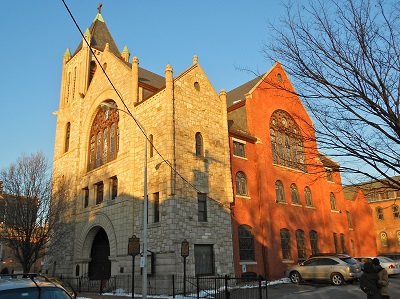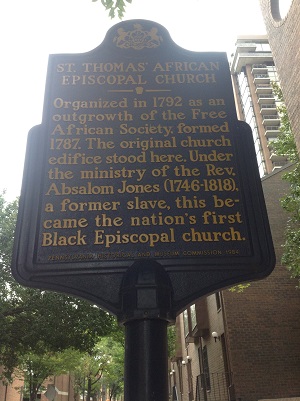Mother Bethel A.M.E. Church:
Page III

Back to the Free African Society
Those blacks who left St. George's turned to the Free African Society as a de facto church. Allen helped to minister to the spiritual needs of those in the group. Over time, the FAS began to take on trappings of Quaker culture. Quakers were admired for their abolitionist views, philanthropy, and moral rectitude. In fact, the FAS charter mandated that all treasurers of the society were to be Quakers. This would facilitate the Society's dealings with financial institutions.
Allen, however, was disenchanted with the Society's mirroring of Quaker ways, finding them inimical with what he felt blacks needed spiritually. Beginning each meeting with a Quaker-like silence of 15 minutes, for instance, was diametrically opposed to the spontaneity and exuberant atmosphere of Methodist services. Unable to embrace the ways of the FAS, Allen was "read out" of the society on June 20, 1789.
Leadership of the Society fell to fellow Methodist Absalom Jones who felt it was important that those in the Society be spiritually attended to. Jones began to draw up a subscription list for the building of a church for the society's members. Though Allen was disassociated from the FAS he enthusiastically supported the plan to form the nation's first black church. Several whites, including Robert Ralston, Benjamin "the father of American Medicine" Rush, and a different William White, the Bishop of the Episcopal church, threw both financial and moral support behind the project.
Allen was given the responsibility of buying land for the church. Laying out his own money, Allen purchased a plot of land at 6th and Lombard in Philadelphia's already historic black community. As a note, during his early years in Philadelphia, Allen supported himself as a chimney sweep and parlayed his earnings into a shoemaking shop which eventually employed several apprentices. He was practicing the diligence and ethos of hard work that he preached. The disciplined preacher ultimately became a rather prosperous Philadelphian, donating almost $10,000 to the AME church.
Allen now owned this property, but the FAS decided that they wanted their church built outside the black community, on Fifth Street, south of Walnut Street, in a mostly white neighborhood. Groundbreaking was in 1791 and Allen enjoyed the honor of breaking earth on the project.
Yet, it was still unclear what denomination the church would be. Since the black walkout at St. George's, the white Methodists had increased the hostility aimed at the splinter group while still trying to lure them back in the fold. Elders at St. George's saw their authority threatened, and in turn threatened to expel the exiles permanently. Allen replied that they could not be part of a church where they had been so "scandalously treated." He addressed St. George's Reverend McCloskey, saying, "If you deny us your name [Methodism] you cannot seal up the scripture from us, and deny us a name in heaven."
The FAS voted to be Episcopalian even though Jones and Allen wanted it to be Methodist. Absalom Jones agreed to head what would be called the Saint Thomas African Episcopal Church. In 1804, Jones would go on to be ordained the first black priest in the United States. W.E.B. DuBois said of Saint Thomas's: "the church has always been foremost in good work." Officers from St. Thomas's went on to found the nation's first black insurance firm.
Allen, however, was still convinced that the discipline and style of Methodism was best suited to the black community in Philadelphia. "The plain and simple gospel suits best for the people — for the unlearned can understand and the learned are sure to understand." Allen was willing to wait until St. Thomas's was completed before building his church.
Why would the FAS opt for the Episcopal church? The hostility of the Methodists contrasted with the largess of Bishop White and the Episcopals. Further, there was antipathy in some members of the FAS toward dance and song traditionally associated with the Methodists. One member is quoted as saying, "It was a shameful practice that we, as a people are guilty of. While we are feasting and dancing many of our complexion are starving under cruel bondage; because of this practice of ours that enables our enemies to declare that we are not fit for freedom."
Back to Africa

Bishop Allen confronted a new threat soon after. The American Colonization Society was an all-white group which included Henry Clay, Andrew Jackson, James Madison, and Thomas Jefferson, who endorsed black emigration to Africa either through voluntary means or through forceful deportation. Clay called blacks "pernicious and useless, if not dangerous." Jefferson said, "Let the ocean divide the white man from the man of color."
Allen called a mass meeting of the black Philadelphia community to oppose this. Allen feared that if the black community supported this movement there would be no one left to aid slaves and also felt blacks should be treated as American citizens with all attendant rights. He wrote, "Whereas our ancestors (not of choice) were the first successful cultivators of the wilds of America, we their descendants feel ourselves entitled to participate in the blessings of her soil, which their blood and sweat manured." Due to the efforts of Allen and other black leaders, the Colonization movement lost momentum after a number of years.
Allen remained influential to the end of his life. In 1830, Mother Bethel hosted the first national convention of black Americans, which led to the formation of the American Society of Free Persons of Colour. The meeting was called to establish a national network of black support and to fight new and heinous actions by the American Colonization Society, and to fight slavery.
One of Allen's last major accomplishments was the formation of the Free Produce Society in December 1830. Members of the society pledged to buy only products made by non-slave labor, whenever possible. Initially advocated by the abolitionist William Lloyd Garrison, the boycott also served as an exhibition of black self-reliance. One of Allen's last lessons was the economic power of boycotting, a favorite weapon of the Civil Rights Movement of the 1960s.
Allen died on March 26, 1831, after "a tedious illness," as his tomb notes. He had the largest black funeral that America had ever seen. Encomia poured forth. William Lloyd Garrison called Allen "one of the purest friends and patriots that ever exerted his energies in favor of civil and religious liberty. His noble deeds will remain cherished in the memory of mankind as imperishable monuments of eternal glory."
Perhaps it was David Walker, a radical abolitionist, who had best understood Allen's significance. Walker, in his 1829 "Appeal to the Coloured Citizens of the Worlds," a vitriolic attack on slavery, wrote of Allen: "When the Lord shall raise up colured historians in succeeding generations, to present the crimes of this nation, to the then gazing world, the Holy Ghost will make them do justice to the name of Bishop Allen. He will stand on the pages of history among the greatest divines who have lived since the apostolic age."




